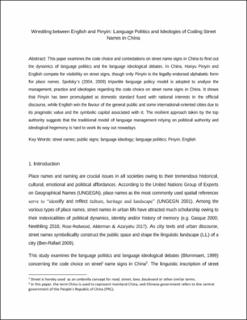Wrestling between English and Pinyin: Language politics and ideologies of coding street names in China
Journal article, Peer reviewed
Accepted version
Permanent lenke
https://hdl.handle.net/11250/2757249Utgivelsesdato
2020Metadata
Vis full innførselSamlinger
Sammendrag
This paper examines the code choice and contestations on street name signs in China to find out the dynamics of language politics and the language ideological debates. In China, Hanyu Pinyin and English compete for visibility on street signs, though only Pinyin is the legally-endorsed alphabetic form for place names. Spolsky’s (2004, 2009) tripartite language policy model is adopted to analyse the management, practice and ideologies regarding the code choice on street name signs in China. It shows that Pinyin has been promulgated as domestic standard fused with national interests in the official discourse, while English win the favour of the general public and some international-oriented cities due to its pragmatic value and the symbolic capital associated with it. The resilient approach taken by the top authority suggests that the traditional model of language management relying on political authority and ideological hegemony is hard to work its way out nowadays.
